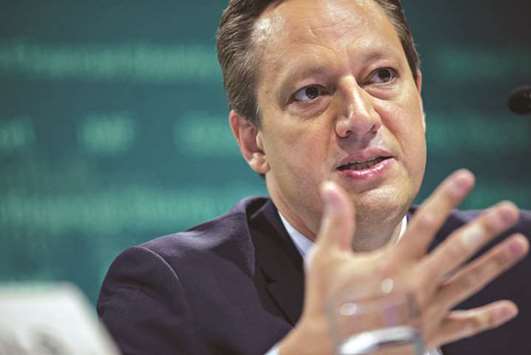Threats to the global financial system are rising, with the price of risky assets surging in a manner reminiscent of the years before the global financial crisis, the International Monetary Fund warned.
Downside risks to world financial stability have increased “somewhat” over the past six months, the IMF said yesterday in the latest edition of its Global Financial Stability Report. “Financial vulnerabilities, which have accumulated during years of extremely low rates and volatility, could make the road ahead bumpy and could put growth at risk,” said the Washington-based fund.
Investors “should not take too much comfort” in the fact there were no major disruptions from the sharp selloff that shook markets in February, the IMF said. “Valuations of risky assets are still stretched, with some late-stage credit cycle dynamics emerging, reminiscent of the pre-crisis period,” it said. “This makes markets exposed to a sharp tightening in financial conditions, which could lead to a sudden unwinding of risk premiums and a repricing of risky assets.”
Prices are frothy across a variety of assets, according to the IMF. Stock prices are high relative to fundamentals around the world, especially in the US, the fund said. Corporate bond valuations are also elevated, with signs of overheating in demand for leveraged loans from firms with low credit ratings, it said.
The warning comes as finance ministers and central bankers from the IMF’s 189 member countries meet in Washington for its annual spring meetings. Global stock markets suffered a sharp correction in late January and early February amid doubts about the strength of the global economy, with US stocks dropping more than 10%.
Managing the gradual return of interest rates to normal level will be a “tricky” task that requires careful communication from central banks and policymakers to “reduce the risks from a sharp tightening of financial conditions,” Tobias Adrian, director of the IMF’s monetary and capital-markets department, said in a foreword accompanying the report. The recent increase in trade tensions has caused “jitters” among investors, “and a wider escalation of protectionist measures could ultimately take a toll on the global economy and on global financial stability,” he said.
The IMF noted that investors aren’t currently pricing in the risk of sharply higher inflation over the next few years, leaving markets vulnerable to an “inflation surprise.”
The emergence of cryptocurrencies represents a new source of vulnerability to the financial system, Adrian said, adding that risks could arise from leveraged positions taken by investors in these assets, which only take digital form. There are also “infrastructure weaknesses” in cryptocurrency exchanges, and the risk of fraud and high volatility, he said.
While the banking sector has become more resilient since the financial crisis, it’s important for countries to follow through on the reforms they committed to after the downturn, the IMF said.

Tobias Adrian, director of the IMF’s monetary and capital-markets department, at a press conference in Washington. u201cThe recent increase in trade tensions has caused jitters among investors, and a wider escalation of protectionist measures could ultimately take a toll on the global economy and on global financial stability,u201d Adrian said.
